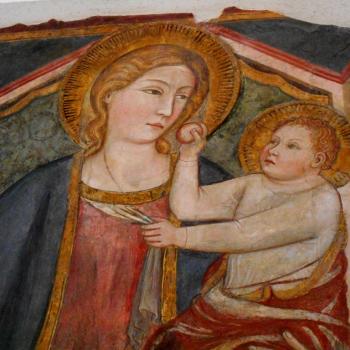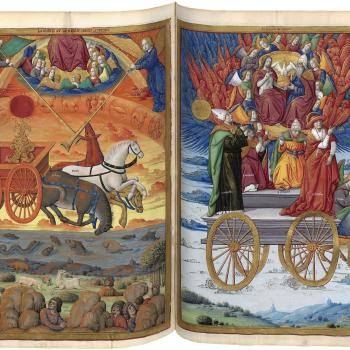It’s easy enough to be sad this Autumn. The Church is yet again in crisis and the fault lines of division in the church seem uniquely inflamed. Far Right Catholics, Viganò chief among them, have used the suffering of victims to attempt to derail a Papacy they see as too progressive. The tone of the debate is not worthy of the Church. Homophobia and bigotry are confused with morality and godliness. In a disgusting gesture, the Resurrection Parish in Chicago burned a rainbow flag that was hung at the first mass. The story has everything you need to know about our current moment: vast misreading, ignorant, rapid-fire reactions, and an alienating righteousness that will, if the church isn’t careful, keep young people away from the church for a generation.
The flag was likely representing the rainbow sent by God to signal the end of the flood in Genesis. It is not at all like the flags one sees flown during Pride month at LGBTQ friendly bars and businesses. The rainbow, a symbol chosen by God, was burned in front of the church to purge homosexuality from the church. It of course accomplished only the one thing Catholics have been good at lately: creating bad press.
The Viganò letter was another massive act of Catholic bad faith. Turning the suffering of victims into a mechanism for one’s own un-Catholic vendetta, Viganò not only questioned Papal authority in an unprecedented way in the modern world, he didn’t have the facts to back him up and within weeks the most scandalous story in the Catholic world fizzled into the background.
Many Catholics lament the loss of young people in the church. I have met more than a few far right Catholics who imagine the churches would be full again if only we hadn’t given in to the secular world and instead provided weekly Latin erudition in traditional liturgy. Certain Catholics, those that fetishize Latin and ornate, traditional liturgy, have always preferred these things and have parishes that can accommodate them, but it seems to me in 2018 a regular flaw of the far right mind to believe that their issues are the issues of the whole church.
Catholic liturgy demands attention. It is not the sort of liturgy that sells itself well to the un-initiated. The central moment of the mass, the taking of the Eucharist, is a quiet and private act multiplied across the parishioners. It televises poorly despite the sacred connection and spiritual food it offers. Too many far right Catholics imagine a stricter world will produce stricter Catholics. This is a fantasy.
I want more than anything for the gift of the mass and the gift of the Church to the land in the lives of the faithful, but too often those who would bring new sheep into the flock are too busy chasing windmills aways from their sheepfold, fighting culture wars they can’t win and neglecting the work of conversion and evangelization at home.
Some questions for those, like myself, who want to see the Church healthy in the next generation:
- Is the Church doing all it can to rebuild trust in light of the abuse crises of the new millennium? This means not only believing and hearing out victims who come forward to tell their stories but also modeling that behavior outside of the church (many conservative Catholics beating their chest over Francis’s alleged handling of clerical abuse are also backing Kavanaugh despite his accuser).
- How can we expect a generation of young people who have grown up to believe that discrimination against women is not only illegal but ethically wrong to embrace a church that excludes women from its diaconate and priesthood, even as almost every other Christian faith has allowed women on its altars?
- Do we really help young people understand the beauty of the Eucharist when we fight these culture wars? Do we teach our young people to cherish life when we scream about abortion but hedge on unarmed, innocent people killed by the police or on sexual assault of women or on racism and sexism in our society?
I count myself among those Catholics who admire the traditional liturgy and language of the Catholic faith, but the future of the Catholic church is not to be found in carbon copies of ourselves. We must see how a faith which has survived for two millennia, adapting along the way, can spread the Eucharist and Christ into yet another millennium, drawing fruit from the seeds we plant now.












